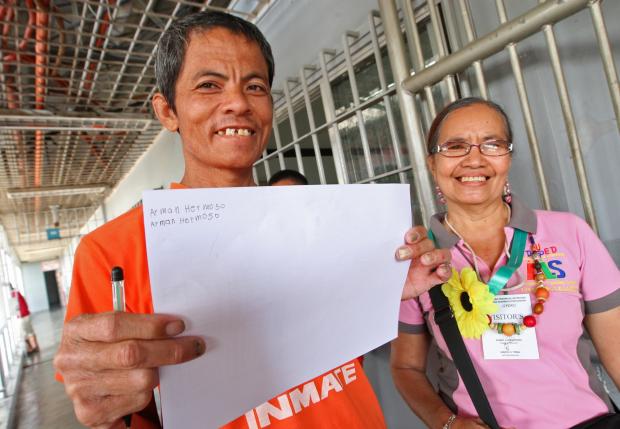
Armoso shows his handwriting with a beaming Dr. Corazon Pomar, division supervisor of the Alternative Learning System of the Department of Education. (CDN PHOTO/ TONEE DESPOJO)
He is 37 years old but inmate Arman Hermoso had just started learning the alphabet.
A native of Carmen town, Hermoso dropped out of Grade 1 to support his family when he was 11. He worked as a construction worker and as a jeepney driver.
Life turned sour for him after he found out that his wife was having an illicit affair.
Hermoso was jailed at the Cebu Provincial Detention and Rehabilitation Center (CPDRC) for illegal possession of firearms two years ago.
PROGRAMS
Things turned around when he decided to join the Alternative Learning System (ALS) program sponsored by the Department of Education (DepEd) for CPDRC inmates inside the jail facility in barangay Kalunasan, Cebu City.
“Paninguhaon nako nga makahuman ko ug high school para matabangan nato atong kaugalingon ug akong pamilya inig gawas nako diri (I will try my best to finish high school here so that I can help myself and my family when I get out),” he told Cebu Daily News while holding back tears.
Hermoso said he and 169 inmates enrolled in the program which started last January.
Now Hermoso can spell a few words with the help from mentors who hold ALS classes three hours a week.
“Paningkamot lang nga makat-on bahala ug lisud (Just try hard to learn despite the difficulty),” he said yesterday morning after slowly scribbling his name in a piece of paper and showed it to this reporter.
The ALS is one of several programs for CPDRC inmates, who gained fame through their dance routines that were broadcast in YouTube and streaming video sites.
DIAGNOSTICS EXAM
Inmates also studied baking and making handicrafts. They also had their recreational boxing team called Supermax.
ALS instructor Marie Daphne Daño said they divided the program into three levels.
She said there’s the basic literacy level for those who don’t know how to read and write, the second level for those who can recognize letters and the third for those who can read but cannot comprehend the material.
Inmates take a diagnostic exam for assessment of their literacy level, Daño said.
DESPERATE NEED
“In my case, I handled the class for the illiterates. I cannot avoid feeling a bit fearful because it was my first time to handle inmates. But with the behavior they’ve shown ever since I met them, I was so satisfied and felt secure because they’re very behaved,” Daño said.
The 40-year-old Daño said she saw the program for the inmates as a challenge and an opportunity for a better life.
She said the inmates deserved another shot at getting their diplomas at the end of the year.
“I’ve seen it as a challenge for my part as a teacher because they are already in that age and they come from a very diverse background. But what I’m sure is that they have one thing in common – the desperate need for a second chance in education,” she added.
“I have one student that he already knows how to read and can now comprehend.
Now I helped him fill up a resume because that is one of the most basic steps to employment. He was so happy afterwards and he thanked me and I was really touched,” Daño said.

